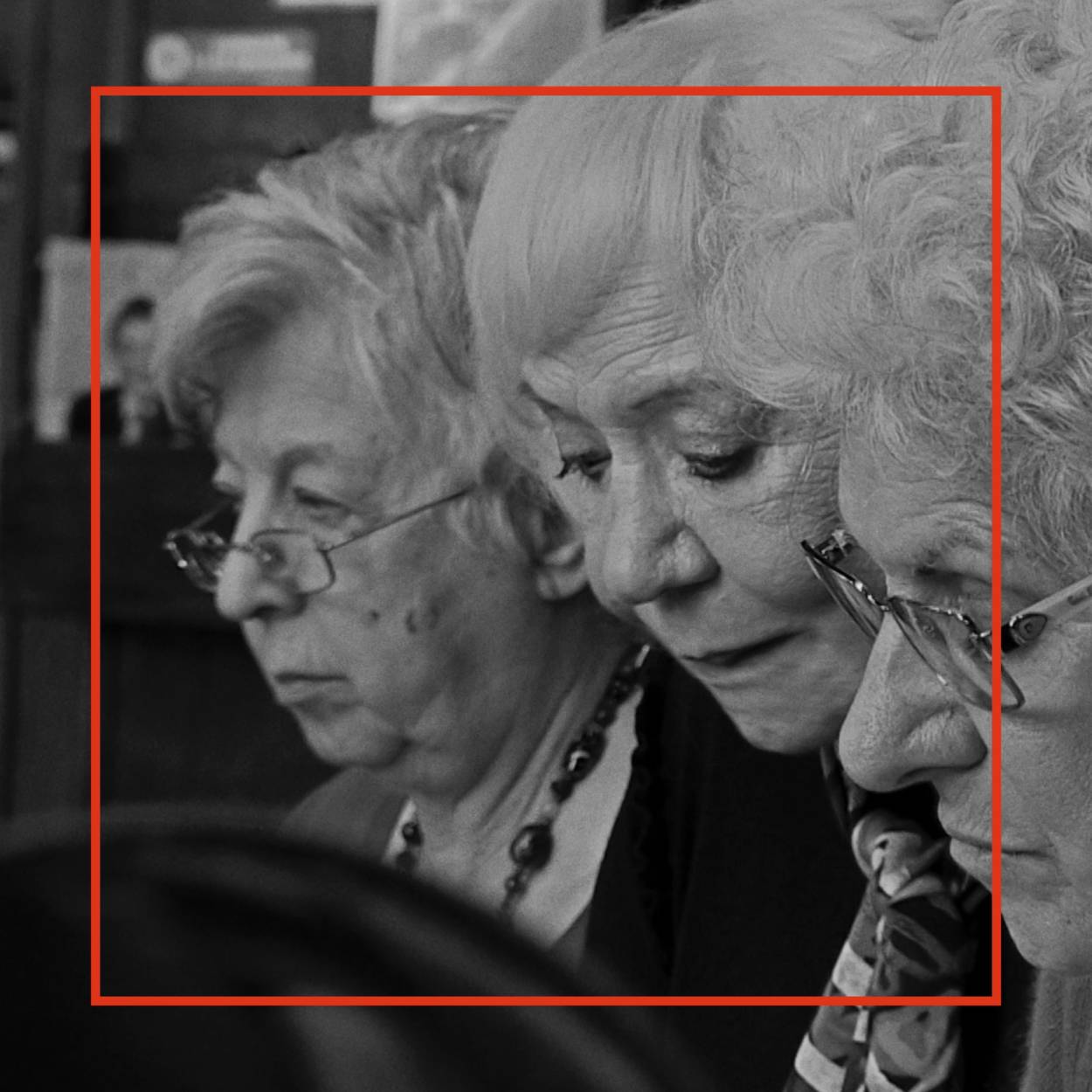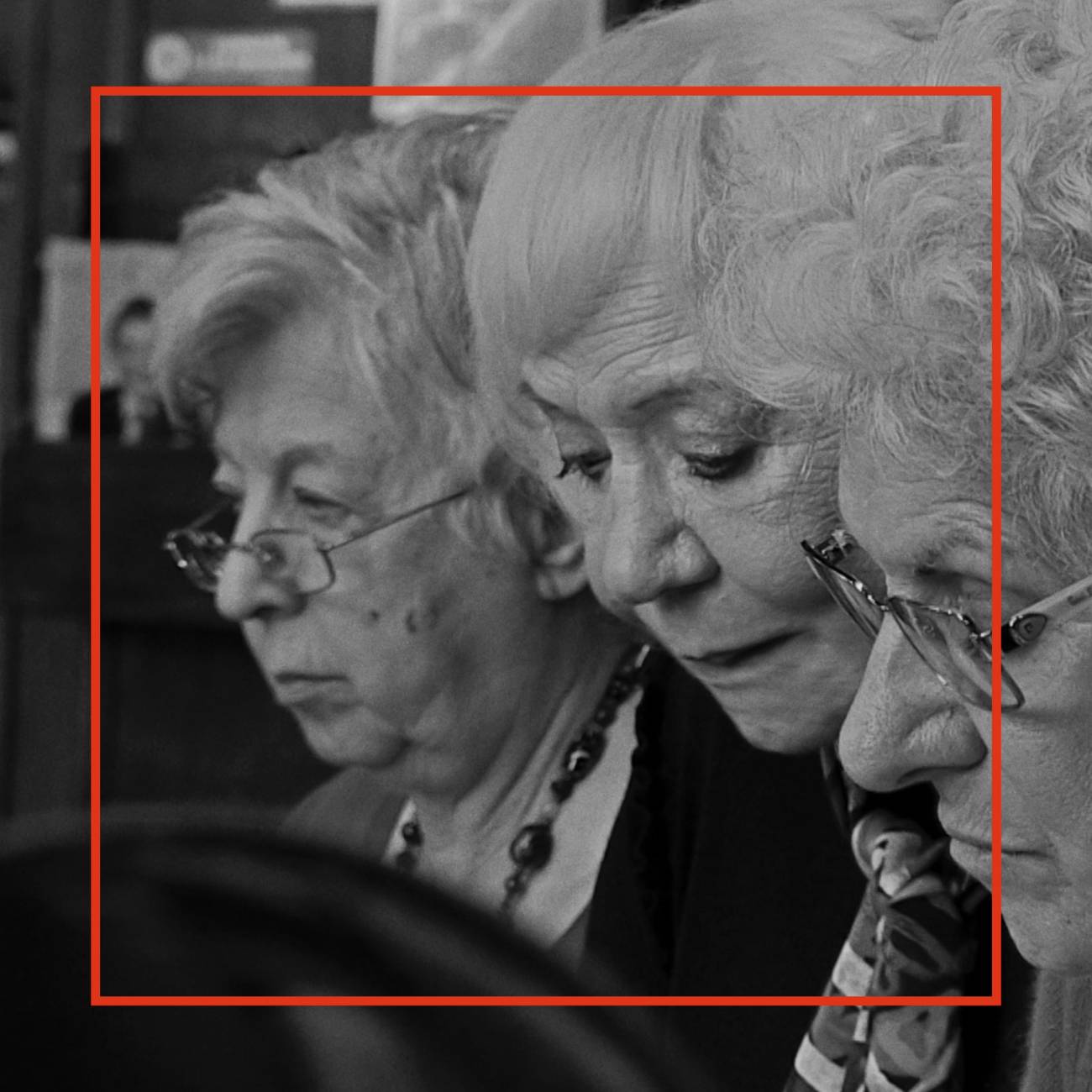Proust in Buenos Aires
Searching for what is lost in ‘Le Temps Perdu,’ María Alvarez’s artful documentary on an Argentine book club




Sometimes the mindset of the critic really does interfere with the capacity to enjoy art. Even when I tell myself I’m off duty, the habits inculcated over almost 30 years of training can click into gear involuntarily, like when I went with a few friends to see the Argentine filmmaker María Alvarez’s Le Temps Perdu on a humid August night—a time of year when everyone in the books and culture business is supposed to be on vacation, or otherwise chilled out.
The film seemed like just the thing for this period of suspended, vacant time at the tail end of summer: a documentary about a group of elderly Argentines who, for 17 years, since 2001, have gathered weekly at a café on Calle Libertad near the Teatro Colón, in Buenos Aires, to read and reread Marcel Proust’s magnum opus In Search of Lost Time. Except, the film isn’t really a documentary at all: It’s not about the group, as such—we learn very little about the origins and motives of the members. Rather it’s a live performance and staged reading of Proust’s masterwork—heavily abridged, of course, and in softly slurred Porteño-accented Spanish.
The group’s members, a rotating cast with several stalwarts who we get to know over the course of the production, take turns reading aloud from selections copied and printed out in large-print format for the visually impaired (“I’m going blind like Borges,” one woman remarks while casually studying the libretto). The choice of sections appears to be the work of Roberto, the group’s founder, who is affable, also somewhat pompous and repetitious. Among his catchphrases, “I have a comment!” (usually uttered when someone else is speaking) and, “As you know, my daughter is named Albertina, for the character in Proust.”
We learn that the mysterious Albertina began the reading group with her university friends before it was taken over and continued in this more ritualized form by her parents. The daughter’s fate hangs over the film like a McGuffin, providing an undercurrent of unresolved dramatic tension until the readers reach the penultimate volume, “Albertine Disparue,” (The Fugitive) when the answer lands with perfect comic timing as an anti-climax.
Alvarez’s filming creates an aura of hypnotic intimacy: slow closeups of these old faces in the act of reading or listening, intercut with wider-angle shots of the whole group seated around the café tables, relieved by brief establishing shots of the weather outside. We are brought to the table with these people as they’re reading, applauding each other and the text, occasionally gossiping or good-naturedly bickering with each other over an interpretation or the details of an event, as the seasons change. Her editing places an emphasis on Proust’s writing about the act of creativity—in writing, in art, and in love—and it’s true that among the many strands of Proust’s novel is the story of its own making. The film moves slowly but also with astonishing rapidity from the opening “drama of the mother’s goodnight kiss” with its magic lantern to the famous scene of the madeleine and discovery of involuntary memory. Then, bypassing Swann in Love and The Guermantes Way—only alighting briefly on Sodom and Gomorrah for the group’s awkward discussion of homosexuality, and then with a bit more about the narrator’s doomed love for Albertine—she brings us to the last sentence of In Search of Lost Time all in an hour and 40 minutes. (In the lobby, afterward, someone remarked that it felt like eight hours, but that he loved every minute of it.)
One result of this remarkable adaptation is that the film feels like a Borgesian exercise, in the style of “Pierre Menard,” a story about the man who sets out to rewrite Don Quixote, not by copying it but by immersing himself in his own parallel Cervantian reality until he spontaneously writes the words himself. The film could be called “The Book Club: Authors of Le Temps Perdu.” One of the club members even remarks that reading and rereading is always a creative act, citing the relevant passage from Proust to prove it.
In the same vein, Roberto describes Proust’s novel as “a 3,000-page murder mystery where we know who the murderer is from the very beginning but he is not named until the end.” This radical interpretation is passed off on a new member who says she’s just on the lookout for social interactions and not much of a reader, but the description sets off a whole debate on why reading such a poorly conceived mystery novel might be, after all, worthwhile.
On its own terms, Alvarez’s Le Temps Perdu is an aesthetic triumph. We watch these old bodies and faces, ravaged by time (that murderer!), immersing themselves like so many living, breathing, talking madeleines into the slipstream of the years, via the capacious teacup of Proust’s novel. The moving revelations that provide half-glimpses into the pasts, thoughts, and characters of the various readers emerge in the course of their “dipping” into the text. They are not extracted through sit-down interviews conducted by the filmmaker or any other breaks in the film’s narrative frame.
It was here that the critic in me began to rebel. Alvarez’s version of Proust, as well as her interview-averse documentary style, her focus on her subject’s aging bodies and insistence on letting them tell as much or as little of themselves as they like, her gift for scene and ritual, all comes at a cost that risks falsifying the entire project: These people lived through Peronism and the years of violent, military dictatorship during which 30,000 Argentines were forcibly disappeared and murdered by their own government, thousands more were ruthlessly tortured, and children were taken away from parents to be raised by strangers. They experienced hyperinflation in 1989 and the disastrous structural reforms of the 1990s which nearly bankrupted the Argentine middle class. Also, as only becomes apparent once the credits scroll and the roll call of the readers’ names appear, at least half the group are Jews. This means, among all these other experiences, they must have memories of the Hezbollah-sponsored bombing of Buenos Aires’ Jewish community center in 1994, as well as the government’s corrupted investigation into the attacks that, once discovered, led to the impeachment of the presiding judge-advocate.
None of this is mentioned in the film. Neither would a viewer of the film unacquainted with Proust’s work know that he was Jewish or that the Dreyfus affair plays a large part in the novel’s early volumes; there’s nothing about Proust as one of the foremost chroniclers of the upper-class antisemitism of his era, along with the pained reactions of self-hating yet resolutely Dreyfusard Jews like Proust’s family. Nor would they learn that the ravages of World War I create a chasm that divides the novel’s belle époque opening volumes from the later ones, beginning with Sodom and Gomorrah—or that Proust writes with fascination, horror, and humor about those new technologies of the telephone, the electric streetlight, the motor car, and the airplane. All of this to say that Proust’s characters, as well as his readers, exist not merely “in time” but also “in history.”
And yet, as I thought all this, I found another inner self rebelling against the critic. Here I was, at the movies, looking for an escape, at a moment when so much contemporary art is deliberately political and “historical” to the point of grinding didacticism. So why did I find myself resisting Alvarez’s dalliance with an aesthetic and kinesthetic relationship to time and the intimate experience of literature? Normally, even when I am “on the beat,” I try to eschew the weak kind of historicism that has crept into so much mainstream reviewing in the form of a selective whataboutery, a lazy way of faulting the author for being insufficiently attentive to the critic’s own social and political anxieties, or, worse, assertions of “the public interest.” I might as well have blamed Alvarez for not first acknowledging that she was filming on land that belonged to the Charrúa tribe.
At the risk of committing such faults, I still couldn’t help this residual feeling that the image of Proust along with those of his loyal Argentine readers had been somehow kitschified or neutered for the sake of some kind of “universalist” message—akin to the way that the Spanish translation subtly alters the meaning of Proust’s famous madeleine scene by substituting “alma” (soul) for Proust’s more equivocally secular “ésprit” (which simultaneously means mind, sensibility, and spirit). For all Proust’s generic interest in “being and time,” he never neglected those very specific qualities that give texture and presence to both. The changing fashions in speech, the proper way to wear a hat, the various moments and ways society marks you out as belonging to a breed apart, the way a blackout transforms a city at war or a technology transforms our relationships to the living and the dead, none of that escaped him. In order to make sense of our relationship to time, to discover what has been “lost” about it and what remains to be regained, we need these details to serve as markers, or else we lose ourselves.
This is as true for criticism, as for art, as for life.
So even as my moviegoing friends sensed my lack of shared enthusiasm and shrank from it; even though, not for the first time, I felt myself slipping into the role of the killjoy—and also not the first time I felt myself worrying about it, as if I had been made wrong—I wasn’t about to just let myself go. Viva Buenos Aires.
Marco Roth is Tablet’s Critic at Large.